

The conference will take place April 8-9 in Duluth, with an evening session April 8 at Duluth Folk School, featuring research posters, and a full day of presentations on April 9 at the University of Minnesota-Duluth.
Research topics include everything from wolves to air pollution, based on studies taking place at sites from Isle Royale to Voyageurs National Parks.
The groundbreaking studies of wolf behavior in Voyageurs National Park which has received broad attention in recent months will be the subject of one presentation. In another presentation, government scientists from Canada and the United States will share their research into how wolves survive in federal wilderness areas compared to unprotected areas.
There will also be presentations with practical findings for land managers, such as the results of a UMD-Nature Conservancy project to study forest management practices to improve climate change resiliency. Other presentations look at wetlands in Quetico Provincial Park, rare plant species on the North Shore of Lake Superior, wildfire, invasive species, and more.
The conference is part of the Heart of the Continent Partnership’s Science Committee’s mission to “build and strengthen a coalition of scientists, land managers, and stakeholders dedicated to the preservation of natural and cultural resources across the Heart of the Continent landscape.”
It seeks to “improve understanding of natural and cultural resources across the HOCP, raise awareness of threats and management challenges to the preservation of those resources, and promote collaboration among scientists, managers, and other partners across political, cultural, and administrative boundaries so that resources can be better managed in a landscape context.”
The Heart of the Continent Partnership is a Canadian-American coalition of land managers and local stakeholders working together on cross-border projects that promote the region’s economic, cultural and natural health of the lakes, forests and communities.
Details and registration are available at this link.

